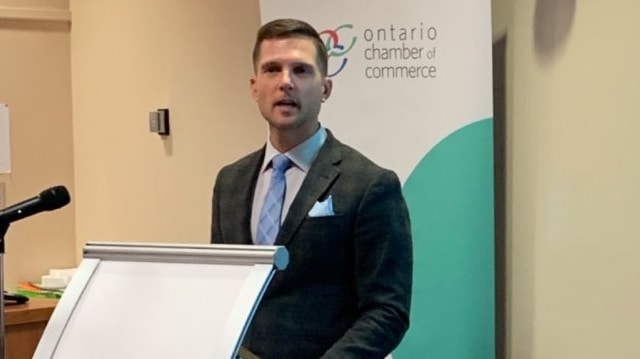Hamilton chamber of commerce CEO to enter 2022 mayor’s race
Published January 18, 2022 at 6:58 pm

Keanin Loomis, who heads the local chamber of commerce, will announce this week that he running for mayor, InTheHammer has learned.
Loomis could announce his campaign as soon as Wednesday, according to multiple sources. A lawyer by trade who settled in Hamilton with his family in 2009, he has been the president and chief executive officer of the Hamilton Chamber of Commerce since 2013.
The next municipal election, which would be the first to employ mail-in ballots, is scheduled for Oct. 24, 2022. Candidates still have several weeks to file nomination papers.
Loomis has also served on the board of directors of Supercrawl, a three-day free arts and cultural festival in downtown Hamilton that was steadily growing in popularity and scale before momentum was blunted the past two years by the COVID-19 pandemic. In September 2019, Supercrawl attracted an estimated 250,000 people over the course of the day along James Street North.
On his Twitter page, Loomis self-describes as a “Radical Moderate.” Loomis and his spouse, Trish Loomis, have three children.
Like current Mayor Fred Eisenberger, Loomis has also worked with the Hamilton-Oshawa Port Authority. He has also been involved with the United Way of Hamilton and Halton, and has served on the Hamilton Economic Summit advisory committee and as chair of an innovation and technology committee.
Prior to becoming head of the Chamber of Commerce, Loomis was also the first employee of the Innovation Factory at McMaster Innovation Park.
In late 2019, he told Global News Hamilton that the city will face many external challenges over the 2020s. Those include, he said, effects of climate change, a slowing global economy, ever-scarce resources and high levels of debt.
Eisenberger re-elected handily last time
Mayor Eisenberger has yet to announce whether he is seeking re-election. So far in his third term, the mayor and city council’s plate has been full during the last term with issues including COVID-19, calls for policing reform to address anti-Indigenous and anti-Black racism and a housing affordability crisis. Eisenberger recently resigned from the police service boards as part of an effort to make it more inclusive.
Grass-roots groups such as IELECT, the Just Recovery Hamilton Coalition and Stop Sprawl HamOnt have also tried to build critical mass for a change in the leadership focus of the city.
In 2018, Eisenberger was convincingly re-elected. He received 54.03 per cent of the popular vote, giving him a nearly 16-percentage-points margin over his only serious challenger, Vito Sgro. The Sgro campaign’s main plank was stopping light-rail transit (LRT) from coming to Hamilton and also spent rougly twice as much as the Eisenberger campaign (just under $229,000 to Eisenberger’s $114,534).
The LRT was initially cancelled by the Ontario PC Party government in December 2019. Last spring, though, it was resuscitated.
The Ontario PCs offered $1.7 billion to build the LRT network, which was matched by the federal Liberal government. City council, after much debate, voted in June to sign a memorandum of understanding with the provincial transit agency Metrolinx. By September, there was unanimous support for the LRT.
insauga's Editorial Standards and Policies advertising





